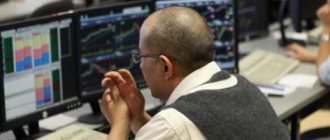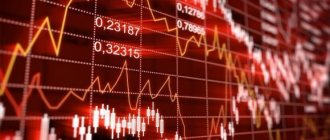How can a beginner make money on the stock exchange?
Today, a huge number of brokerage companies successfully operate on the Internet, with the help of which anyone can start making money on the stock exchange, having a small reserve of funds for investment. The broker will provide you with the necessary tools for trading on the stock exchange. Brokerage companies such as Alfa Capital, Uralsib, Troika Dialog, VTB, Finam and others have fairly high ratings on the RuNet. They have managed to establish themselves in the market as a reliable partner, the majority of clients trust them. The brokerage company will not only give you access to the exchange, but will also provide preliminary training. After which, you will be able to independently use the software tools provided to you for traders.
Registration and start of trading
To play on the stock exchange on the Internet, a beginner needs to choose a brokerage company, register and open an account. The registration process will not take much time. The broker's website indicates the trader's first and last name, email and mobile phone number. In the future, the company manager can contact the client and ask for confirmation of registration.
Next, before you start playing, you need to open an account on the exchange and top it up. Each company has its own requirements in this matter. Some brokers allow you to play with several hundred rubles in your account. However, most firms open a deposit of at least $100.
Very often, exchange managers persuade the client to immediately start playing and deposit a significant amount of real money into the account. This is not surprising, because exchange intermediaries make a profit on spreads and commissions from each transaction, regardless of whether the client receives income. However, experts recommend that beginners first play on a virtual account.
The next step is to install a trading terminal on your computer. This is the name of special programs for making transactions. The most popular trading platforms on the exchange are:
- QUIK;
- TRANSAQ;
- MetaTrader.
There are also terminals written for a specific broker: Finam-Trade, Alor-Trade, Alfa-Direct, etc.
After completing the basic course of playing on the stock exchange and making money, you can try your hand at making transactions.
How can a beginner make money on the stock exchange at home?
If you plan to work from home permanently, pay attention to the fact that stock exchanges operate on their own schedule. The operating hours of some of them differ significantly - it all depends on which trading exchange they belong to. When you choose an exchange resource for trading, be sure to take this fact into account and choose those sites that are open at a time convenient for you. The second point that you need to pay attention to is the commission required by a particular brokerage company. Too high a commission will deprive you of normal income - look for companies that approach commission issues adequately.
Which exchanges should I trade on?
The first step for a novice trader is choosing a trading platform. The exchange is an electronic system in which the purchase and sale of assets is directly carried out. At the moment, there are dozens of large alternatives in different countries around the world.
Russian
The easiest way to become a participant in exchange trading in our country is to register on any Russian trading platform. It is worth paying attention to the Moscow and St. Petersburg platforms.
Moscow
The Moscow Exchange is the largest Russian platform for trading operations. The range of financial instruments is extensive:
- securities (stocks and bonds);
- currency;
- precious metals;
- derivatives;
- other.
Access to trading is provided through a brokerage company, which acts as an intermediary.
St. Petersburg
Within the Russian jurisdiction, this is the largest stock exchange, where, in addition to Russian shares, transactions with foreign securities are carried out, and access to the commodity market is also provided.
Foreign (most popular)
The world's largest stock exchanges provide access to promising foreign securities.
NYSE (New York)
No other platform in the world can compare with the scale of the New York Stock Exchange. It personifies the financial power of the United States, so the system takes its own status responsibly.
Only reliable, liquid shares are allowed for trading. Currently, there are about 2,800 companies among the issuers.
LSE (London)
This option is more suitable for those who already know the basics of trading and have sufficient funds for profitable investments. The activity of participants of the London Stock Exchange is based on legislative protection; the placed securities of companies must necessarily justify their solvency. The result is attractive assets for long-term investment.
NASDAQ
He is also a representative of the American stock market. It is inferior in terms of the number of participants to the NYSE, but is also attractive in terms of security and liquidity of transactions. Key specialization is high-tech enterprises.
AMEX
AMEX is a large American regional exchange, which is a structural division of the NYSE Euronext association. The main index is XAX, which combines the aggregate status of securities and depositary receipts of enterprises, in particular oil and gold mining.
Tokyo (TSE/TYO)
TSE is Japan's main trading platform. In terms of capitalization, it is one of the three largest systems in the world. Today, more than 2,300 companies are represented here, 30 of which are foreign issuers.
How much do you earn on the stock exchange?
No professional broker will give you a definite answer to this question. Too many factors ultimately influence the earnings of the average trader. You shouldn’t fall for advertising that tells you that you can get a huge income in the first month of trading on the stock exchange. This is wrong. There are no limits that really limit a trader’s earnings. But this is in theory. In practice, everything is much more prosaic. On average, traders who take a responsible approach to trading on the stock exchange “raise” amounts that amount to about 20% of the funds they invested in trading. Even very successful traders rarely reach 40%. Accordingly, your earnings will depend on the size of your investments.
How to choose a trading strategy for a beginner
As you know, successful trading directly depends on the speculator’s ability to predict price fluctuations and open transactions on time. If we conduct general statistics, it is easy to notice that there are certain well-established rules and norms in the market.
There are different analysis methods and rules for entering and exiting bets. In total, trading is distinguished according to 3 basic principles:
- news;
- trend;
- patterns.
In the future, everyone makes their own amendments and modifications to the strategy. As a rule, new analytical tools are added and patterns are found for successful entry and exit points.
Trading with the current trend
The most famous and proven strategy is still popular and brings stable profits. The most common and well-known trend trading strategy is the play on the breakout of an equidistant channel.
This is the general scheme of action. That is, the trader sets conditional lower and upper limits of the trend at the extreme points of closing transactions (the body of the candle or the corners of the chart). The general price movement is determined and the location of the breakdown is expected.
In theory, everything sounds great, but in practice it is rare to find an ideal model, as in the picture. In real life, you need to simultaneously take into account several trends and find a narrowing point or a triangle pattern in order to approximately know the exit point.
The simplest example is to find two converging lines at the same time. At the intersection, a price reversal is possible; it is advisable to close the deal before the changes begin or curb a new wave of rollback.
It is imperative to take into account the behavior of business sharks, because with their investments they can completely change the course of a trend and ruin speculators. Therefore, try to predict the opinion of resellers in advance.
Trades based on patterns
The analyst finds certain figures on the chart and, based on them, predicts further market behavior. Excellent as a complement to the previous strategy to determine the location of the reversal.
A pattern is a stable figure; when it appears, you can increase the likelihood of predicting price movement.
Japanese candlesticks are most often used to identify patterns, but there are also bars and a line chart. There are many situations in which you can see a market reversal. At first, it is recommended to master at least 3-5 precise patterns and open bets based on their basis.
For example, let's look at several patterns. An example of a rebound from the center line in a graphical drawing.
The same situation in the market often occurs against the backdrop of an uptrend; it appears when a trader tries to bring down the price, but there is not enough investment to reset it.
Japanese candlestick patterns
We recommend that you study Japanese candlestick combinations separately. Thanks to them, you can predict the reversal point with a probability of up to 90%. They will be excellent additions to patterns and trend trading.
Japanese candlesticks are one of the types of chart presentation. The body is formed in them over a certain period of time. Depending on the combinations of ascending and descending candles, you can predict market reversals with a high chance.
An example of some combinations after which the trend changes:
- Inverted hammer (end of bearish beginning of bullish trend);
- Bullish engulfing;
- Triple gap.
There are many other figures and candlestick patterns to analyze, but knowing these three is enough to get you started. An example of the same situations on a real chart:
Such analysis consists of finding positions and making quick decisions. Japanese candlesticks are great for fluctuations on various time periods; the main thing is to have time to close the position before the next reversal.
News Factors or Straddle Trade
A company's securities are dependent in part on the company's performance and the investments of investors and customers. If previous strategies analyzed charts directly, here you need to look at news portals and predict the behavior of independent people (ordinary buyers).
Speculation of this method is most suitable when working with securities of various companies and stores. For example, Samsung, Apple, Xiaomi, M. Video, etc.
Follow the following instructions:
- Visit as many news portals as possible and read all the latest news, reports, and analytical reports.
- Find the appropriate news, for example, “presentation of the new IPhone X.”
- Analyze how this information will affect the company's shares (whether new buyers or investors will appear).
- You invest funds to buy or sell securities.
For example, a presentation of new Apple products recently took place. Including iPhone 8 and iPhone X. It is logical that on the day of release many people will want to buy the product and due to this the company will enrich itself (the shares will rise in price). Therefore, you can safely purchase securities and wait for a payback with a high probability.
In addition, financial reports of companies, news about sales, new acquisitions, etc. are regularly published on various forums.
How to make money on the stock exchange via the Internet?
It is not immediately that a newcomer to the stock market begins to enjoy trading (many people turn around and leave this market before this moment). Both psychologically and emotionally it is necessary to be a fairly stable and balanced person. In addition, you will have to master the technique of trading on the stock exchange, which not everyone can do. As a rule, out of 10 beginning traders, only 1-2 people fully master trading and remain. In order to start earning money, you need:
- Master the entire theory of trading on the stock exchange, get acquainted with its specifics and features.
- Learn to constantly control yourself, not trade in an excited state, and not act under the influence of emotions.
- Gain impressive experience working with various exchange platforms.
How to choose the best broker: advice from analysts
Successful trading on the stock exchange cannot be achieved without cooperation with a qualified broker. Finding such an intermediary is a very difficult task, especially for stock exchange beginners. Experts in the stock game highlight some basic tips that will help novice players choose the broker that is most suitable for them.
First, pay attention to the commission fees that the broker sets. As a rule, their size ranges from 0.04 to 0.1% of deductions from the transaction amount. Some brokers operate according to a different scheme - they charge a fixed fee for their intermediary services. With this option, commission fees are deducted from each transaction made. If you make large transactions involving large amounts of money, then charging a fixed fee will not be a burden for you, but if you are on the exchange for a few quick and small transactions, then this commission option can seriously reduce your expected profit. This is why the option of deducting commission fees plays such an important role in choosing a broker.
Secondly, find out in advance about the minimum deposit amount set by the brokerage company. Not all intermediaries introduce a limit on the smallest amount of funds invested in the game on the exchange, however, every day more and more companies begin to use it when registering new clients. It is not profitable for brokers to carry out small transactions, because such operations bring lower commission fees. For this reason, the minimum deposit amount sent to the account ensures that a higher percentage of fees are collected from each player. According to recent research, at the moment, most brokerage companies set the minimum amount of invested funds to start playing on the stock exchange in the region of 20-25 thousand rubles. It is best to choose a broker whose minimum deposit amount does not exist or is much lower than the specified figure.
Third, review the list of margin documentation that the broker provides to its clients. It is necessary in order to decide on the manner of playing on the stock exchange. Not every security is open to instant sales operations. The broker should provide you with a list of all margin securities provided, after reading which you will develop a strategy for playing on the stock exchange and better work out the manner of your trading activities. Remember that the wider the list of margin documents, the more profitable it is for productive exchange trading.
And finally, fourthly, clarify in more detail the information about the terminals provided by the intermediary, as well as access to analytical calculations and news feeds. Cooperation with a brokerage company should bring you benefits in everything - not only in terms of publishing applications for financial transactions for you. The broker needs to provide you with comfortable conditions for conducting your transactions, as well as for making plans for further trading. That is why you will need wide access to exchange terminals, and financial news and analytics from an intermediary will help you predict market behavior and outline a strategy for the game in the near future.
Based on these tips, we can recommend the following brokerage companies to you. Each of them is highly qualified and has significant experience in working with exchange transactions. All of them also meet the above criteria:
- Alpari - the company has been working in the financial sector since 1998 and during this time has managed to become one of the most popular intermediaries among exchange players from all over the post-Soviet space. Cooperation with this broker is evidenced by its international recognition - the company has three times received international licenses for intermediary activities from the world's leading financial analysts;
- Zerich (JSC Investment Company Zerich Capital Management) is a broker operating in Russia since 1995. The company is one of the associations that formed the domestic market of intermediary services for trading on the stock exchange. The firm provides its clients with assistance in the stock and bond markets, as well as the foreign exchange, trading and derivatives trading sectors. Experts recognize Zerich as a broker with a high degree of reliability;
- "Finam" (JSC "Investment") - this broker is the leader in the domestic market of intermediary services. The company firmly holds leading positions in the ranking of Russian brokerage houses in terms of financial turnover, number of active and registered clients within the Moscow Exchange and the all-Russian futures and options market. The company's representative offices are located in every major city of the Russian Federation. According to experts, Finam is one of the intermediaries with an exceptionally high level of reliability and a stable development forecast, which assumes maintaining the company’s rating in the foreseeable future. The company provides many services available to clients with varying amounts of funds invested on the exchange. In addition to providing access to Russian platforms, Finam also helps with games on foreign exchange platforms. The company offers its clients the possibility of 100% capital protection and regular consultations with experienced employees who can increase the efficiency of investing in stock trading;
- Otkritie (Otkritie Broker JSC) - this office is part of the largest financial group of the Russian Federation of the same name, operating in the financial sector since 1995. The broker offers its clients a wide range of services provided not only on domestic, but also on foreign trading platforms. Also, with the help, even novice players can get open access to all sectors of the Moscow Exchange. The Russian rating agency annually confirms the highest rating of this company, classifying it as one of the group of brokerage houses with an exceptionally high level of reliability.
Each of the brokerage companies under consideration can rightfully be considered a reliable partner for exchange players. It is recommended for both newcomers to the stock exchange and experienced financiers to cooperate with them. It is with the help of these intermediaries that it will be much easier to achieve success on the stock exchange.
If we analyze the advantages and disadvantages of the brokerage houses mentioned above, then our recommendation for choice is clear - this is. There are two things that support this advice.
The first is the wide profile of the site’s work. The broker helps its clients master not only domestic exchanges, but also foreign resources. This will allow you to trade on a much larger scale and make greater profits.
The second is the company's reputation. As surveys show, almost two-thirds of Russian traders prefer to do business with Finam employees. Exchange players are most captivated by the broker’s reliability, which is confirmed by the rating agency of the Russian Federation. Based on these two reasons, we recommend this company for cooperation.
Stock exchange how to make money
The process of trading on the stock exchange is usually called trading. Its main task is to make money on various financial transactions with currencies, shares of large companies, futures and more.
The stock market is quite multifaceted. Today it is represented by stock, derivatives and currency exchanges. For example, the MICEX in Russia is a stock exchange that specializes in trading shares of companies. But the RTS is a derivatives market; it works with options and futures. You must independently determine which exchange market you would like to gain a foothold in and where to trade. Choose those sites where work seems closest and most understandable to you. The success of your activities and, of course, your profit will depend on this.
How to lose money with a guarantee?
Most beginners in private investing make the same typical mistakes, which differ only in the scale of losses. Don't do this.
- Don't trade for luck or chance. Every action you take must be thoughtful and informed - and most importantly, based on data and analytics. For example, you saw signs of growth in Gazprom shares and decided to “dump” your stake amid the growth, and the next day they grew by 40%. Why? Because the market was waiting for the release of positive financial reports and increased dividends - the reports were released, growth began. You correctly read the market signal, but did not make a profit because you were in a hurry. And for an experienced investor, the state of affairs in the issuing company and information about all events is the most important tool. Even if you cannot give an accurate forecast and in-depth explanation of market processes, you should at least know what trends are worth selling, buying or holding assets in your investment portfolio.
- Don’t expect instant fabulous profits - you can’t “trade for 10,000 and withdraw 100,000 in a week” (even to scammers). Depending on the investment strategy, profitability is formed, which can also be negative. “Fabulous” profits can be the result of a risky investment by an experienced investor, but this is often just a matter of chance, because the results of high-risk investments are poorly predicted.
- Quitting your job to become an investor is the worst thing that can happen to a newbie. The path from the first thought to an experienced broker can take 3 years, or 5 years of fairly intensive training. I will speak directly from my experience: even after 3 years of specialization in financial mathematics, securities management and stock exchange business at a university, the only thing you can do professionally and reliably is to recognize scammers. “Making money” on the stock exchange does not work; you need additional training and practice. Again, basically, brokers who work with client accounts are employees of financial organizations and, in addition to commission payments, have a salary and, if necessary, can easily move horizontally to analytics or training. If you give up everything, install QUIK, connect your account and start “playing on the stock market”, get ready to eat little, dress poorly and save a lot. The conclusion is simple: either trading in the stock market is a source of additional income and an intellectual hobby for you, or you are consciously learning and changing your profession. And yes, trading on the stock exchange is not a game, it is work, even for a private investor.
- There are no mistakes worse than the previous point, but a confident second place goes to using the money you need now or in the near future for your first steps in the stock market. For example, if you are saving for a mortgage, a car or any other large and necessary purchase, and suddenly decide to quickly “save up”, leave this idea - the risk is too high. But if you have a “box” where you save your free funds and you are sure that you will not need the money in the near future (I recommend considering an investment period of 3 years), you can safely try your hand at increasing capital through a brokerage account. But remember - you may not only not receive additional profit, but also lose the principal amount of your investment.
- Don't mess with virtual currency.
The next two mistakes relate directly to the choice of investment instruments and they are two extremes of investment behavior.
- It is a mistake to use only one investment instrument (for example, invest only in shares of one company, only in dollars, only in gold, etc.). More precisely, in this case, you do not get active investment, but a rather conservative tool for “saving” money, which can bring income in the long term. This type of investment can be compared in efficiency to a bank deposit.
- It is no less a mistake to invest in everything, especially in risky instruments, obscure startups, new companies, in shares against the backdrop of hype around some events. This attitude towards your portfolio leads to a loss of profitability and a lack of understanding of the basics of structural investments. Ultimately, you may find yourself in a situation where you simply cannot predict the behavior of market participants and the market's reaction to them.
Here is this tweet
I am selling almost all physical possessions. Will own no house.
— Elon Musk (@elonmusk) May 1, 2020
caused this movement:
So predict your portfolio based on Twitter (by the way, an excellent way - there is already an understanding that the tweets of corporate CEOs, and even more so of politicians, and in particular D. Trump, actively influence stock market trends)
You know, what indicates that you have approached working in the stock market right? You must be bored. Excitement in investments (any kind!) is the worst advisor.
We choose the stock market for various reasons: out of interest, for investing and saving free funds, out of a desire to earn money, or simply to learn something new. Some developers, after getting acquainted with the stock market, change their specialization and go into the development of trading robots.
The stock market is a complicated story. In reality, no one can consistently successfully predict the future of the stock market: today you will hit the mark, and tomorrow other investors (that’s why this is speculative trading - in the good sense of the word). This, of course, is not roulette or a slot machine, but the whole difficulty lies in identifying the trend and learning how to do technical and fundamental analysis. Everything else is based on this. And programmers, mathematicians, and technicians are often good at analyzing trends, but to say from day one “I’m an expert in economics” is too arrogant and can turn against you. Remember: there is always a risk.
What is a stock exchange?
An exchange is a platform on which representatives of buyers and sellers enter into various transactions with each other. Most contracts are concluded with the help of intermediaries.
Comparing an exchange with a market is an incorrect example, since there is always a product on the market that belongs to the seller, and all agreements are reached without the participation of an intermediary. The absence of goods is the main advantage of the exchange, thanks to which it becomes possible to conclude a transaction without actual delivery.
How to make your first money on the stock exchange?
Beginner traders are recommended to start with the least risky start in the form of working with stocks or futures. Over time, you will develop an understanding of the process of making money with these tools. With your first experience, it makes sense to try your hand at working with derivatives or switch to Forex. The main thing is a large amount of regular practice and strict financial discipline. Do not risk too large sums, minimize the size of losses, minimize the number of unprofitable transactions and the first profit will not be long in coming.
What to read on the topic?
- Moscow Exchange - desktop site of the Russian investor (one of)
- Quote.ru
- Review of scammers
- Brokers.ru has good analytical materials and examples, but remember that the site is dedicated to Forex, and Forex can be different (we’ll talk about currency later).
- Collection of investment ideas (can be analyzed as tasks)
- Lots of financial analytics. markets
- Working with portfolio strategies
- Money came
- Fanimani - a lot of separate cool videos
And of course, read financial, political and insider channels on Telegram - information appears there first (after Twitter ;-)).
The list of references and sites varies greatly depending on the selected tools, so there will be additional references in articles about different tools.
If you have experience in investing (positive or negative), tell us in the comments how you started, what you stumbled upon, and did you quit?
Trading strategies in the securities market
Absolutely every trading strategy is based on either maximizing profits or minimizing risks. Both of these factors are opposed to each other. The task of each investor is to choose a strategy with the optimal balance of risk factors and profitability when trading shares. All strategies are divided into conservative and aggressive. However, there are also moderately aggressive ones. Beginners are advised to choose conservative (with minimal risk) strategies so as not to lose their initial deposit in the first days of working on the exchange.
How to build a portfolio?
There are three main investment parameters: profitability, investment period and risk. Accordingly, each portfolio is determined by the relationship between these factors. Here, as in the old joke: choose any two. In the chart you can see the ratio for different types of investors.
I think the most optimal ratio for investing: diversify - invest at least 40% in reliable instruments, 10% in high-risk instruments, distribute the remaining 50% based on liquidity and your main strategy. The optimal investment period is up to three years (including due to tax laws). The easiest option to start is to open an IIS (individual investment account, we will talk about it later).
Money management. How to manage risks on the stock exchange?
Money management rules:
- Trade only with your own funds. No loans.
- Do not invest all your investment capital in one asset or one broker.
- Do not increase the transaction volume by an amount that exceeds the initial volume by 10 times.
- Avoid big losses.
- The optimal amount of losses for one trading day should not exceed 2% - 5% of the deposit amount. These numbers should be used as a guide when using stop losses.
- Try to make your profit 3 times larger than your losses.
- Do not open a large number of transactions at the initial stage.
Choosing a brokerage company
There is no universal formula. Therefore, you have to dig through tons of information to choose the most suitable partner. Pay attention to the size of the commission, the level of the software, the range of available services, and, of course, reviews on the Internet.
Many brokers have special starting offers for beginners. Study these sets of services from several companies to assess the prospects for further cooperation.
Evaluate the recommendations of experienced traders, experience in the market, as well as the authority that the organization enjoys in professional circles.
How to make money on the stock exchange with a small starting capital?
Today, there are almost no restrictions regarding the threshold for entering the market. You are allowed to start even with minimal amounts. Some brokers suggest starting with a deposit of 1,000 rubles. For earnings and success, the size of the starting capital is not of fundamental importance. The main task is to cover the purchase of the minimum lot and pay the broker’s commission. Of course, not all market operators offer such favorable conditions, but recently there are more and more available options.
Advice from Sravni.ru : You've probably seen an advertisement that Warren Buffett made a fortune for himself by trading on the stock exchange, the size of which is today estimated at 42 billion US dollars. At the same time, few people know that the return on capital invested by this trader in the stock exchange is about 30-32%. This is to think about how much the average person can earn from stock trading...
How much money should a beginning investor have and where to get it?
There is no set amount. Among brokers you can hear amounts starting from 100,000 rubles, but it is clear that this is a story for the passive behavior of the novice investor himself (that is, if you entrust capital management to a broker and do not make decisions on transactions yourself). If you decide to try to earn money on your own, then you can take the following minimums as a basis:
- “standard” minimum - 10,000 rubles
- IIS (individual investment account) - up to 400,000 rubles. in year
- for the purchase of domestic blue chips - 10,000 rubles.
- for the purchase of foreign products - highly depends on the selected assets
But, I repeat, these are conditional amounts: you can choose your own, sometimes the minimum amount of funds in the account is regulated by the broker with whom you will be serviced.
The main thing is to determine the important parameters of the funds that you are willing to invest.
- At the beginning of your investment practice, do not invest the latter; you should have a reserve of funds. One of my best practices is to save 10% of any income (left, right, awards and bonuses - that’s all, even gifts). If there is no goal of saving for something important, you can try part of this money in trading on the stock market.
- Do not take out a loan for investments (with the exception of leverage, special leverage from a broker) - you may lose the borrowed money rather than increase it. And if it’s a shame to lose your own, then it’s also scary to lose someone else’s.
- Be prepared to “free up” your funds for a period of about 3 years - sometimes this is due to the return of personal income tax, sometimes with the formation of a long-term low-risk portfolio, etc. Well, plus, you definitely won’t immediately find the most winning strategy for you.











